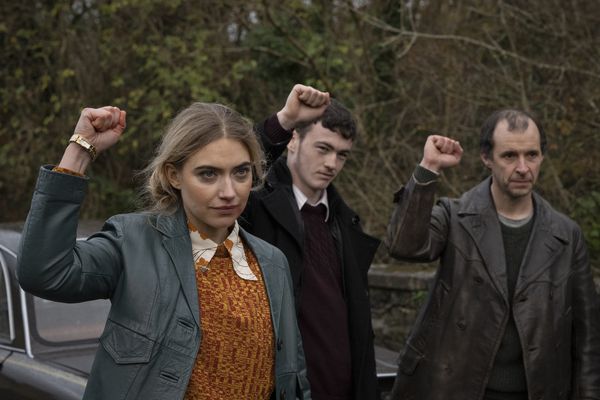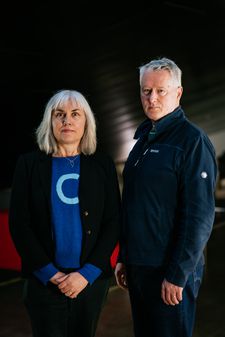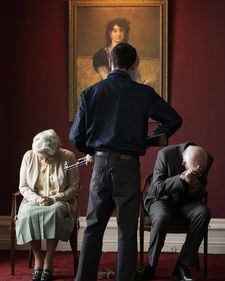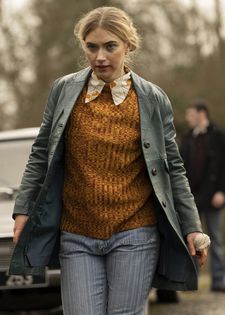 |
| Baltimore |
The Desperate Optimists, filmmakers Joe Lawlor and Christine Malloy (Helen, Mister John, Further Beyond, Rose Plays Julie and The Future Tense) take a different approach in their latest film, Baltimore, by basing it on a true story. The film follows Rose Dugdale (Imogen Poots), the English heiress who became a revolutionary. Drawn to Marxism she denounced her life of privilege, and joining the IRA’s fight for a united Ireland, on the 26th April 1974, Dugdale and three accomplices, Dominic (Tom Vaughan-Lawlor), Martin (Lewis Brophy) and Eddie (Jack Meade), stole 19 paintings from Russborough House, with the intent of leveraging them for the release of IRA prisoners.
 |
| Christine Molloy and Joe Lawler |
In conversation with Eye For Film, Lawlor and Molloy discussed their 'slightly unnatural' aesthetic, and Dugdale’s influence in trying a new approach, within a body of work that has refused to repeat itself.
Paul Risker: The striking thing about your films is how distinct they are from one another. How would you describe your cinema?
Joe Lawlor: Well, I don't see it as part of a clear tradition that's identifiable, for example, social realism. I equally don't see it as part of a magical realist tradition either, but it would be more towards that.
Christine Molloy: … We see each film as a puzzle to be figured out. Every time we go to make a film, we have to find a structure and the [type of] storytelling to suit the film we're trying to make. I guess what makes each film different is we don’t structurally and formally repeat ourselves. We like to find a grammar, which is the word we used to use, or a reference Joe also used quite a lot was that it's a jazz piece. Each is different and within a jazz piece you have to find the structure to find your way. That has always been the interesting creative challenge and I guess it's why we keep making our work.
We're also not striving towards something in particular; we're not trying to perfect a way of making our films. You could say because a lot of our work is formally explorative, it'll be worts and all. You won't have figured it all out before you have to call a halt to the edit, but the quest to try and figure out each film is why we’re still interested after all these years.
JL: … There are certain filmmakers like Michael Haneke or Stanley Kubrick that we would look towards and try to have a connection with, but whether we do or not is another thing. There's a whole world of filmmaking in-between those two. We like real situations, but somehow the tempo of them is slightly unreal, poetic or theatrical. It’s realism with a bit of topspin on it, that's not part of a formal school that you'll find in film studies. It’s real and yet there’s something about it in the timing or the type of dialogue that doesn't sound like or have the rhythm of how people actually talk. So, there's possibly something about the theatricality and theatrical realism.
CM: I would say a little bit off kilter or skewed.
PR: Watching Baltimore a second time, the way it leans into a theatrical staging was more prominent.
CM: ...We saw our first short films as pieces of theatre and the use of the one take is almost like the curtains go back, and it doesn't end until it's over. It’s something that you need that level of engagement with, like in a theatre show, where you're creating something to all hold on together, and the performers we worked with in those first short films, it was that sense of endeavour.
Now, of course our feature film work is different, but we came from a theatre and performance background, although it was quite experimental. That's probably always infused our work and maybe that also has a lot to do with the performative qualities and the way people perform in our films. As Joe said, the use of language and the way the performances seem ever so slightly, with a very small "s", unnatural.
PR: The sound is also unnatural, as if the film were in an echo chamber. It unnerves the audience, making it difficult to find that comfort level we’re accustomed to.
CM: We see the approach to the editing in Baltimore as this piecing together side-by-side, without any easing in. Between the raid and the cottage, or Rose’s backstory, those scenes clash in the adjacency of the edit. Watching it ourselves, we feel you don't settle into things in quite the way you [normally] would and it's a bit abrasive.
 |
| Baltimore |
PR: What motivated the use of the striking red background for the film’s title?
JL: It might be the theatrical red curtain, but it's certainly the red and yellow communist colours. Rose was a Marxist, so those colours were very resonant for her. There was something about the framing of it as well. We used to have that colour and it used to be structured day one, day, two, day three… and we would go through up until day ten. We felt it broke up the rhythm too much because it's already quite a broken structure - three timelines that go back and forth quite harshly. If you insert that colour and go day-by-day, it's another break. So, we took that out and it became less broken and enhanced the jump from one narrative structure into another. There was something about the colour that was a preface, but those colours were specifically to do with Marxism, communism, or left-wing ideologies that were important to Rose.
PR: What was the genesis of the film and why did you choose to tell this story now?
CM: We’d first come across Rose Dugdale when we were making The Future Tense. We were looking for a line through the documentary that would allow us to go on a road trip around Ireland. Joe had stumbled across her story because he was doing a bit of research on Russborough House, that had featured in our documentary, The Further Beyond. Coming across her story, we thought it would be an interesting way to go around Ireland, going to the places associated with her story.
So, we’d already done a lot of research around her because it this very important through-line for The Future Tense. It was a way of getting us around Ireland because we were engaging with the question whether we could we go back and live in Ireland, and we wanted to have a good reason to travel.
It was all about Rose Dugdale, but at some point, during the making of the documentary we both began to think we should actually engage with her in a more serious way and do something we'd never done before - write a script based on a true story, rather than material we've generated ourselves.
At the time we were interested in thinking about our relationship to England and how that's changed post-Brexit. We’ve a perennial obsession with identity and Rose had a desire to completely redefine herself and her world. She started out over here and ended up over there. You think, 'How the hell did that happen?’ Also, her interest in disguise and performance, she regularly donned wigs and accents and made-up stories. Elements of her story were ripe for us, and she is a fascinating character.
There are things about her that you'll never unravel. I know there was a recent Guardian article, and the writer was saying she's an enigma. But in a way, she is because we all are. You’d be foolish to think you could get to the bottom of anybody. With Rose, you can look at certain things along the way, and you’ll question why she did that because she came from a very particular class, era and background. At every point along the way she had a different mentality to her peers and the people around her. That's the bit that's hard to fathom, but yeah, it was attractive to us for lots of reasons.
JL: It really came from that documentary and then things spiral and you become inspired. That's how it began and like lots of things, it just grows and develops, or it doesn't. Sometimes ideas only go so far, and you realise maybe this isn't a feature film. But in this particular case, we're glad to say it became Baltimore.
 |
| Baltimore |
PR: I’ve always disagreed with the idea that characters must be sympathetic. Instead, the necessity is that they’re interesting. Rose is a captivating character who you don’t try to make sympathetic, nor do you condemn her. Each viewing of the film offers a different experience, as we confront a character that challenges us intellectually and emotionally.
CM: She's a tricky and divisive character. Post-Bloody Sunday, she decided the way she was going to redefine herself in the world was to become an active member of the IRA. She was prepared to kill people if that's what it took, and she believed in the arms struggle. I feel she told herself there was a point at which this was inevitable. Now, why she wanted to be part of it we don't know. I think she's described this herself, where there was the thrill, it was exciting times but there was another part to it where she bought into the ideology. The thing we realise about her is everything she did, was to the hilt.
As a Marxist, she gave all her money away and most Marxists that come from a privileged background don't do that. Then she's going to come on board with the cause of a united Ireland. She's going to go 110% and she's going to be prepared to kill. So, it makes her a tricky and difficult character because it's easy to think, who does she think she is when she had no skin in the game? And what made her decide that she had the right to do that? Of course, they were very difficult times and lots of people died under terrible circumstances - innocent bystanders, women, and children. We know the history of The Troubles, so it makes her incredibly tricky to take on, and try to find a route through that, where we don't lionise and damn her – this was the challenge we took on.
But we found her compelling, and I agree with you, I like to be interested in people. I don't necessarily have to empathise or even like someone when I'm watching a film to find them interesting. There are a lot of people who instinctively wouldn't like her and even if she turned her back on her life, they're still going to burden her with [the status of] her birth and call her an attention seeking toff. She has been called all those kinds of things, but once she made up her mind, she never went back.
PR: Dominic and Martin’s humour is sometimes dark, other times playful. It’s an important part of the film because their humour is disarming. Whereas Rose keeps us at a distance, their humour sometimes reveals a gentler side to Rose and takes us inside their world.
JL: It's an important observation in the sense that, Dominic who spent some time in a seminary training to become a priest, is loosely based on an IRA volunteer who was a priest. It was all kinds of complicated people and in some cases quite intellectual people. We wanted to have the rookie, a teenager and that was true. Rose did work with teenagers to do various activities.
You end up hopefully being challenged by the cliché of Republican IRA volunteers, who or what they might be like. They’re not simply bad gangsters, and you might have to open your mind a little bit more and think about who they are, and, in the process, you might have to think about what they think they're doing. It was important to us that the characters are complicated and have complicated feelings about the world around them, and sometimes naïve thoughts about what they're doing. I mean this raid on Russborough House was, yes very audacious, yes very violent and dark, but also amateurish. I guess we wanted the film to have all of those qualities, so it was all part of the complexity of the people.
Baltimore was released theatrically in the UK and Ireland on 22 March 2024.





















